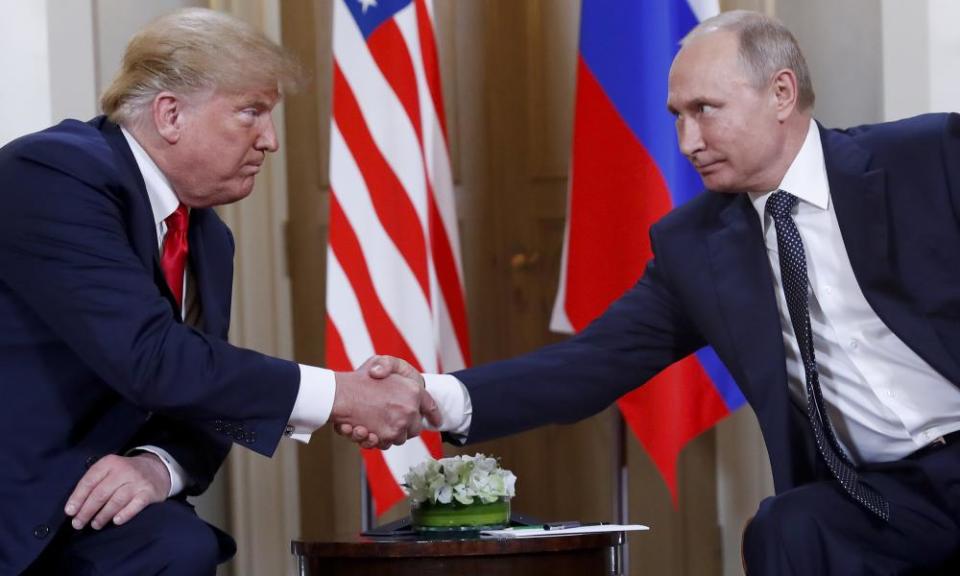The Apprentice review: Trump, Putin and the subversion of US democracy
Greg Miller of the Washington Post proves one urgent thing: the Democrats must take the House on Tuesday

Still not convinced the Russians colluded with Donald Trump to make sure he became president of the United States? Greg Miller, national security correspondent of the Washington Post, suggests that you consider this:
Imagine a scenario in which US national security agencies uncovered secret communications between a powerful political candidate and a foreign adversary. Among the messages were statements of praise of that country’s authoritarian leader and requests for surreptitious campaign help – followed by evidence that enemy spy agencies instigated an interference operation that touched nearly every corner of the election.
Then once in office, that candidate proceeded to secretly demand that efforts by the CIA, justice department and Congress to uncover what had occurred in the election be shut down. Further imagine that he adopted that foreign country’s position on countless issues and attacked its enemies as if they were his own.
There is also the fact that on the day Trump declared “Russia, if you’re listening, I hope you’re able to find the 30,000 [Hillary Clinton] emails that are missing,” only a few hours passed before Russian hackers launched their first spear-phishing attacks against private email accounts used by Clinton’s personal office and 26 addresses associated with her campaign.
“All of this happened,” Miller writes. But instead of it happening in secret, nearly all of it occurred in plain sight, overwhelming the ability of most journalists to keep up and preventing millions of average voters from reaching the rather obvious conclusion that Trump is Vladimir Putin’s apprentice.
At a moment when the president’s non-stop efforts to revive every kind of prejudice have culminated in the discovery of more than a dozen bombs mailed to Trump opponents, and 11 Jews have been massacred at their place of worship in Pittsburgh, Miller’s book makes a vital contribution to our understanding of how we got here. As he writes, all of the “societal fractures exacerbated by Trump tracked many of the same fault lines – race, religion, guns, and immigration – that Russia had sought to exploit with its social-media campaigns”.
This book tells many interlocking stories: of greed (on the part of Facebook, Twitter and Google); incompetence (by the Democratic National Committee); deceitful behavior (by the Trump campaign, Mitch McConnell, Devin Nunes, Paul Manafort, Carter Page, George Papadopoulos and many more); and the incredible energy and efficiency of Russia’s Internet Research Agency (IRA).
American domination of technology companies had produced “an asymmetric vulnerability that a country like Russia could exploit”. Silicon Valley executives were too greedy and too naive to react to the Russian effort quickly. Even after it succeeded, Facebook’s Mark Zuckerberg pretended that “to think it influences the election in any way is a pretty crazy idea”. The DNC took months to react to an FBI warning that its computer systems had been penetrated. Republicans repeatedly blocked efforts by the Obama administration to issue a bipartisan warning.
When James Clapper and Jeh Johnson finally released a statement about the Russian effort on 7 October 2016, it dominated the news for 30 minutes – until the Post reported on the Access Hollywood tape and Trump’s boasts about sexual assault. Immediately after that, WikiLeaks released another huge batch of John Podesta’s emails, stolen by the Russians.
The IRA was housed in a modest office building in St Petersburg that turned out to be a more potent weapon against American democracy than all the nuclear missiles in the former Soviet Union. In 2014, the Russian firm began its effort to infiltrate YouTube, Facebook, Instagram and Twitter, “and unlike the costly stratagems of the Cold War … the disruptive potential of the internet was vast and unbelievably cheap”.
How Clinton became Putin’s enemy after she attacked the legitimacy of Russian elections has been well told by Frontline and others. But no one has done a better job than Miller of describing the vastness of Russian efforts to destroy her.
A Russian teacher named Marat Mindiyarov told the Post that working at the IRA made him feel like a character in 1984, in “a place where you have to write that white is black and black is white”, a factory that turned lying “into an industrial assembly line”.
Russian trolls exploited and exacerbated American tensions around every subject. There were “pretend groups” for gays and lesbians, politically active Muslims, African Americans angry at police brutality, gun rights enthusiasts, immigrant opponents –even the pro- and anti-Beyoncé. “Facebook,” Miller writes, “would later disclose that the Internet Research Agency disinformation campaign … had reached 126 million Americans – an astonishing number” given that the total number of Americans who voted for Trump or Clinton was less than 132 million.
There was also an especially vicious voter suppression campaign which painted Clinton as a racist and urged African Americans to boycott the election.
And yet, Miller writes, the huge online skirmishes produced by Russian trolls “seemed quaint compared to what came later through no effort from Moscow: images of US officials separating children from the their parents … and scenes of white nationalists carrying torches through Charlottesville” – protesters who were then called “very fine people” by our president.
Who wrote the rulebook for such behavior? Putin, of course: a man who has “obtained and maintained power by silencing critics, rallying conservative extremists, demonizing certain minority and ethnic groups, and reinforcing the idea that democracy meant chaos.
“Trump, again, was Putin’s apprentice, summoning a side of America that sapped its claims to moral authority.”
Unless Americans committed to justice, decency and the rule of law come together at the ballot box on Tuesday, to elect a Democratic House, the apprentice will have a real shot at recreating Russian authoritarianism in America. As Miller writes, even now, “it’s hard to imagine that even a master manipulator like Putin would have anticipated the full success of his operation”.

